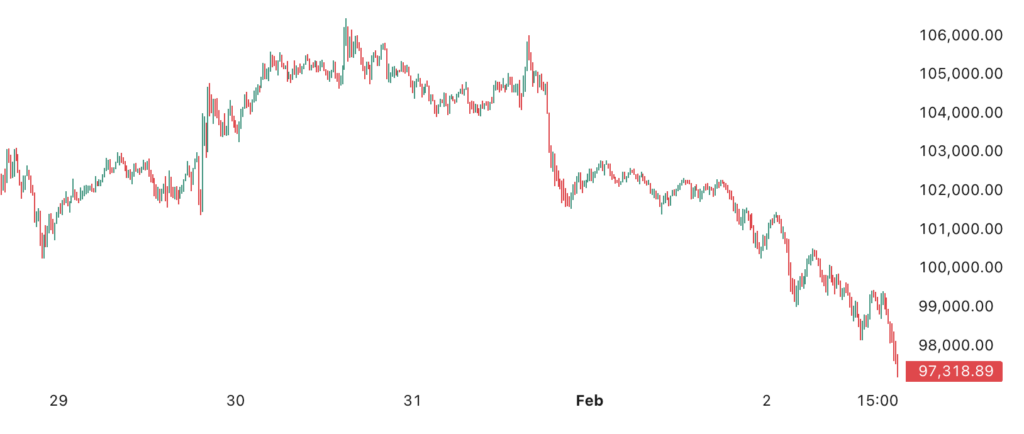- February 2, 2025
- Category: Weekly Crypto Digest

This week in crypto was nothing short of eventful. Bitcoin dipped below $100,000, rattled by profit-taking and macroeconomic concerns, while the Federal Reserve’s decision to hold interest rates steady added to market uncertainty. Meanwhile, Tether posted a record-breaking $13 billion profit, reinforcing its dominance despite rising competition.
On the regulatory front, KuCoin settled a $300 million lawsuit with U.S. authorities, marking another major crypto enforcement case, and the Czech National Bank made headlines with its proposal to add Bitcoin to its reserves. Read the article below to learn more about these and a few more top crypto stories of the week.
1. Bitcoin Dips Below $100,000 After Reaching $105,000
Bitcoin experienced a volatile week, kicking off with strong momentum at $105,000 before dropping below the psychological $100,000 mark. The sharp correction was triggered by profit-taking from large investors, concerns over U.S. economic policies, and global macroeconomic instability.
The Federal Reserve’s decision to maintain interest rates at 4.25-4.5% momentarily provided support, but uncertainty regarding future monetary policies kept investors cautious. The total crypto market capitalization shrank by 5.6%, closing the week at $3.53 trillion. Despite the short-term decline, many analysts remain optimistic about Bitcoin’s long-term growth, expecting a recovery toward $110,000 as institutional demand persists.

2. Federal Reserve Maintains Interest Rates, Crypto Reacts
The Federal Reserve opted to leave interest rates unchanged at 4.25-4.5%, aligning with market expectations. In his post-meeting remarks, Fed Chair Jerome Powell acknowledged that U.S. banks are increasingly exploring crypto-related services, emphasizing that they must follow proper risk management frameworks when dealing with digital assets.
Although the Fed’s neutral stance provided temporary relief, broader concerns about inflation and a potential recession kept financial markets—including crypto—under pressure. Bitcoin and major altcoins saw increased volatility, with many traders watching for further macroeconomic developments in the coming months.
3. Trump Imposes Tariffs on Canada, Mexico, and China, Impacting Markets
U.S. President Donald Trump escalated trade tensions by announcing new tariffs on imports from Canada, Mexico, and China, sending shockwaves through financial markets. The decision, aimed at protecting domestic industries, raised fears of a potential trade war, leading to instability in both traditional and crypto markets.
Bitcoin, often viewed as a hedge against economic uncertainty, initially saw an uptick in trading volume but ultimately dropped below $100,000 as investors responded cautiously. Historically, tariffs and trade wars have led to market volatility, and analysts believe further trade-related actions could influence Bitcoin’s appeal as a macroeconomic hedge.
4. Chinese AI Model DeepSeek Shocks Markets
China’s DeepSeek AI startup introduced its latest DeepSeek-R1 model, a cutting-edge AI system designed to compete with GPT-4 at a significantly lower computational cost. The breakthrough sparked enthusiasm in the tech and blockchain sectors, but it also contributed to heightened uncertainty in global markets, triggering a sell-off in risk assets, including crypto.
Investors liquidated over $500 million in crypto holdings, fearing potential disruptions in the AI-powered trading and blockchain automation industries. While some see DeepSeek-R1 as a game-changer, others worry about its impact on traditional AI investments, particularly those linked to blockchain-driven AI projects.
5. Tether Posts Record $13 Billion Profit and Expands Reserves to $143 Billion
Stablecoin giant Tether, the issuer of USDT, reported an all-time high annual profit of $13 billion for 2024, highlighting its dominance in the digital asset space. The company also significantly boosted its reserves, increasing its U.S. Treasury holdings to $113 billion, further strengthening the stability of its flagship stablecoin.
As of December 2024, Tether’s total reserves surpassed $143 billion, with USDT’s market capitalization reaching $137 billion. Despite this, USDT’s dominance dropped to 65%, facing growing competition from Circle’s USDC, which expanded to $52 billion—especially in Solana’s DeFi ecosystem.
Additionally, Tether has been diversifying its operations, investing heavily in energy, Bitcoin mining, artificial intelligence, and telecommunications. The company also secured a regulatory license in El Salvador, where it established its new global headquarters.
However, Tether faces challenges in Europe, where regulatory uncertainties surrounding MiCA (Markets in Crypto-Assets Regulation) have led major exchanges to delist USDT, raising concerns about its future accessibility in the region.
6. KuCoin Admits Guilt in U.S. Case, Pays Nearly $300M in Fines
KuCoin’s parent company, Peken Global, officially pleaded guilty to running an unlicensed money-transmitting business in the United States, agreeing to pay nearly $300 million in fines as part of a settlement.
U.S. federal prosecutors, who charged KuCoin and its co-founders Chun Gan and Ke Tang in March 2024, accused the exchange of failing to register with the CFTC and FinCEN, thereby violating anti-money laundering (AML) laws. Authorities revealed that KuCoin’s platform facilitated billions of dollars in illicit transactions, including money laundering from darknet markets, ransomware groups, and fraudulent investment schemes.
As part of the settlement:
✔ KuCoin will exit the U.S. market for the next two years.
✔ Co-founders Gan and Tang will step down from their executive roles.
✔ Each co-founder will personally pay $2.7 million in fines.
✔ KuCoin’s operations outside the U.S. will remain unaffected.
Despite these legal challenges, KuCoin remains one of the largest crypto exchanges, processing billions in daily trading volume.
7. Czech National Bank Considers Bitcoin Reserves
The Czech National Bank (CNB) is evaluating a proposal to allocate up to 5% of its €140 billion reserves into Bitcoin, potentially making it one of the first European central banks to hold BTC as a strategic asset.
This proposal, introduced by CNB Governor Aleš Michl, aims to:
✔ Diversify the bank’s reserve assets.
✔ Take advantage of Bitcoin’s strong historical returns.
✔ Follow the trend of institutional Bitcoin adoption in the U.S. and other regions.
Michl referenced the success of Bitcoin ETFs in the U.S., stating that Bitcoin’s inclusion in reserves could enhance long-term returns. However, the plan faces significant regulatory hurdles, with critics warning about Bitcoin’s price volatility and potential policy risks.
The CNB board is expected to review the proposal in the coming months, and if approved, it could set a precedent for other European central banks to follow suit.
Add a comment
You must be logged in to post a comment.

